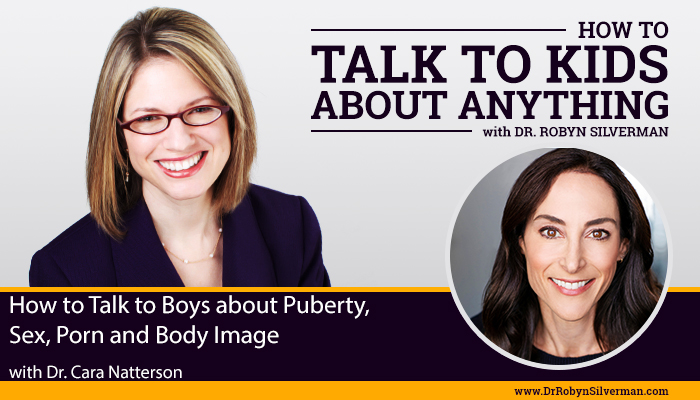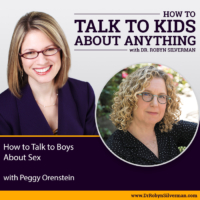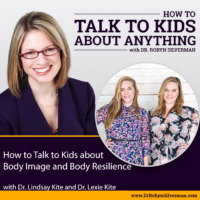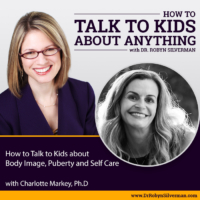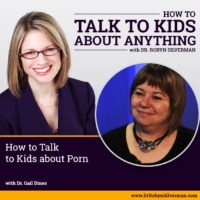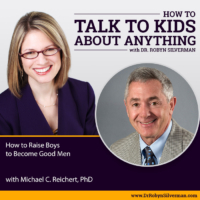Podcast: Play in new window | Download
Subscribe: Apple Podcasts | RSS | More
How to Talk to Boys about Puberty, Sex, Porn and Body Image
This podcast will focus on how to decode boys and talk to boys about puberty, sex, porn, nudes and body image. It’s vital that we talk to boys about these tough topics as it’s part of keeping them healthy and safe—and that’s a big part of our job as parents. Dr. Robyn Silverman interviews Dr. Cara Natterson about how to talk to boys about this sensitive subject matter. Boys deserve to have the right information that helps them learn about positive relationships and sex and, at the same time, helps to protect them from becoming vulnerable to societal messages about body image, pornography and violence.
Guest Expert: Dr. Cara Natterson
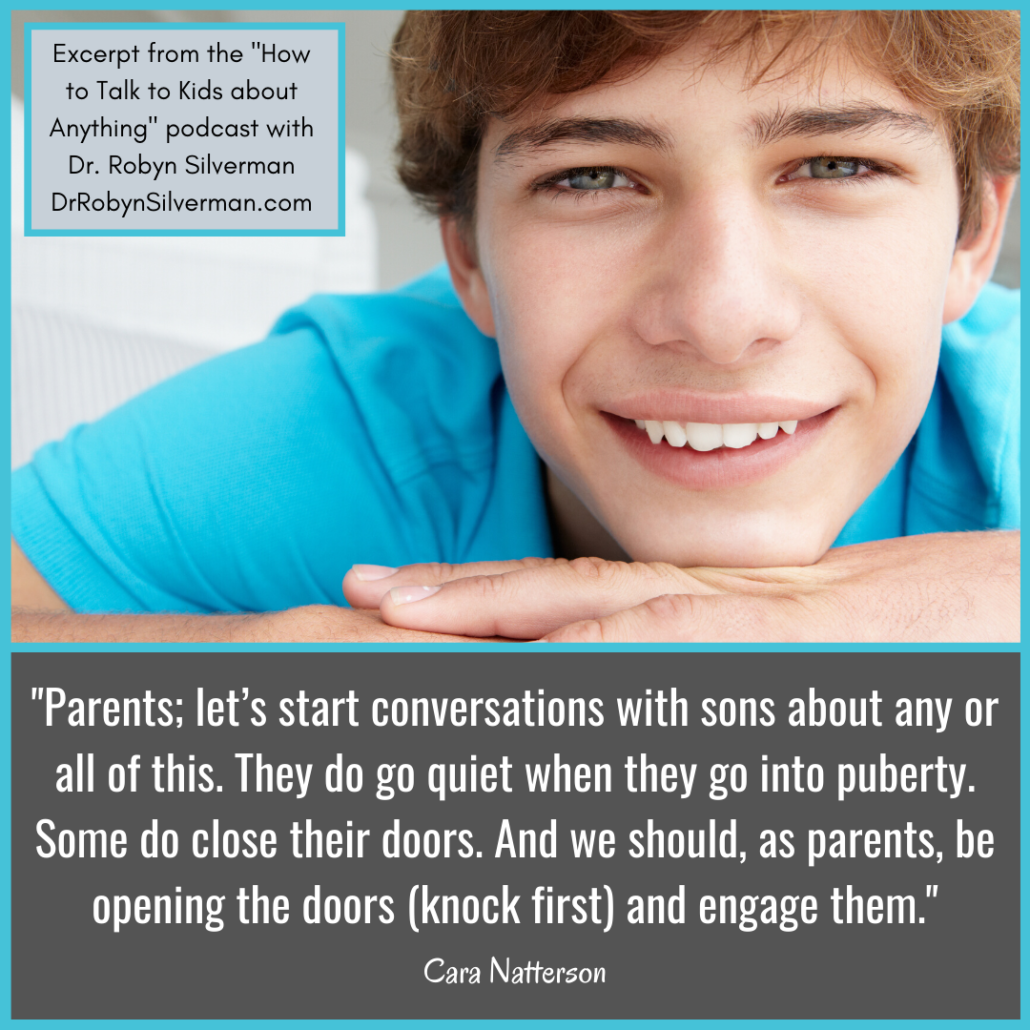 With so much research done on girls in the area of puberty, sex, owning their bodies and understanding their moods, there has been a refreshing move to including boys in the conversation after many years of assuming that they just quietly and easily flowed from child to adult (unlike their female counterparts). Of course, just because boys often got quieter during puberty, doesn’t mean that they don’t have a lot going on—a lot that we really do need to discuss. In fact, leaving our sons to manage the ups-and-downs of puberty on their own denies them accurate information and leaves them vulnerable to societal messages about body image, pornography, and violence.
With so much research done on girls in the area of puberty, sex, owning their bodies and understanding their moods, there has been a refreshing move to including boys in the conversation after many years of assuming that they just quietly and easily flowed from child to adult (unlike their female counterparts). Of course, just because boys often got quieter during puberty, doesn’t mean that they don’t have a lot going on—a lot that we really do need to discuss. In fact, leaving our sons to manage the ups-and-downs of puberty on their own denies them accurate information and leaves them vulnerable to societal messages about body image, pornography, and violence.
Now you’ve heard the interview I did with the fabulous Peggy Orenstein on Boys and Sex as well as well as the fascinating interview I did with Micheal Richert on How to Raise a Boy. Now we are going to leap headfirst into some of the pressing questions we want answered about what’s really going on with boys as they are going through puberty. “What is my son doing behind his constantly closed door? What’s with his curt responses, impulsiveness, newfound obsession with gaming, and…that funky smell? And of course, for our purposes, how do we talk to him about all these things he’s going through so he doesn’t feel alone and confused about what he’s feeling and what’s happening to him? Time to get comfortable with feeling a little uncomfortable again—as we delve into decoding boys with best-selling author, Dr. Cara Natterson.
Cara Natterson, M.D., is a pediatrician, popular speaker, consultant, and New York Times bestselling author of multiple parenting and health books, including the Care and Keeping of You book series, which has more than six million copies in print, and Guy Stuff, the corollary for boys. She has now written a book called Decoding Boys: New Science Behind the Subtle Art of Raising Boys—and provides information that is write up my alley—in fact, she writes on the very first page; “we can’t decode our boys if we don’t talk to them.” Yes! Dr. Natterson is a graduate of Harvard College and Johns Hopkins Medical School, and she trained in pediatrics at the University of California at San Francisco. After working as a general pediatrician for many years, she founded Worry Proof Consulting, a first-of-its-kind practice offering parents open-ended appointments. She also provides medical expertise for numerous parenting websites and serves on several boards including Starlight Children’s Foundation, Mattel’s Barbie Council, The Honest Company’s medical advisory, and Zemcar, a safe rides service for children. She lives in Los Angeles with her husband and their two teenagers.
The podcast provides:
- Some key tips to keep in mind when talking to boys
- Discussion points about physical changes boys experience
- What we should we talking about with boys regarding sex
- What to discuss regarding sending “nudes” and boys
- What to say to our boys regarding porn
- How to talk about potentially embarrassing issues for boys like spontaneous erections
- Discussion points around boys and body image
Important Messages:
- Puberty isn’t as gendered as we make it. The transformation is very universal. Doesn’t depend on XX or XY.
- Parents talk more to girls than to boys about puberty and sex- need to shine light on this.
- Eye contact can further magnify an already tricky moment. Lights off or car or walk. Lack of eye contact- especially when parents and kids don’t have conversations as part of their typical routine.
- Just stop talking at times- need to be quiet. Build the quiet. Bring it up. They talk. You feed off it. If they aren’t ready. Sit with the silent. Learn to be comfortable with the silence.
- “No matter how close you are with your child, there are going to be things that they’re not going to be able to talk to you about- so get a surrogate! A person who your child does feel comfortable talking to about a certain difficult topic. Who would you go to talk to about this or that? Need to forewarn the surrogate.
- Empower kids with information. Most parents don’t talk to kids about testosterone.
- PUBERTY: Boy puberty is largely governed by testosterone. That’s the hormone that transforms a boy into a potentially reproductive man. When boys enter puberty, their testicles become testosterone factories. They start pumping out a lot of this hormone. The testicles grow so that they can do this. Growth of the testicles is the first sign of boy puberty. Vocal cords change shape. Voice starts to crack and drop. Pubertal growth spurt. Shoulders broaden. Effect son brain and mood. (Not a sign of puberty—hair and stink- governed by cousins of testosterone- by adrenal glands related to kidneys- adrenarche- often in sync with puberty)
- *How and when we talk to kids about puberty depends entirely on the kid and the parent. It depends on personality, temperament, how much info you tend to circulate in home, physical proximity, where the siblings are in the birth order. Layer on top- what you’ve already done. Withheld? Given info? Anxious kids? Isn’t a perfect time or right time.
- If you make basic conversations about puberty, health and wellness, part of the norm, it’s a really easy in to talk about anything. “You may start noticing some changes in your body” is overwhelming. Instead- why you eat what you eat, what makes your body grow…and speaking of growing I’ve noticed a bunch of kids in your class have gotten really tall, what do you think about that? Or “do you have any questions about body stuff? My body grew and changes- I’m around.” Or “It’s my job as a parent to tell you things that other people won’t tell you. So I want to tell you, you smell a little different than you used to- and I don’t want anyone else to smell it and not tell you…you’ve got to use soap in the shower and here’s how you do it.” Very non-judgmental.
- Average age of onset of puberty happening early. From age 11 for girls in the 1960s, to now age 8-9 (breast buds). For boys, used to be 11.5, and now measuring for testicular size, age 9 and 10. Not too early to tip toe into these conversations if you have an 8 or a 9-year-old at home!
- Sex and boys: Where Cara Natterson leaves off is where Peggy Orenstein begins.
- The average first viewing of pornography for boys in this country is somewhere between age 11 and 13. These boys are not going out looking for porn. Porn is finding them. Seeing images- not sex education that we don’t want for our boys. Want our boys to have positive and healthy relationships—and certainly positive and healthy sexual relationships when they are older. Violent and aggressive. This statistic has meant that, whether you like it or not, you have to begin the conversations around sex and healthy positive relationships- both boys and girls- at home. They can not be entirely outsourced.
- Porn is seen before boys are even thinking about what their first kiss would be like. So premature. Writing a narrative, we need to help our children rewrite.
- Parenting strategy that we shouldn’t always use- “this is how it was for me so this is how it’ll be for you.” Sometimes good strategy but for many, it’s an entirely different world. Online. #Metoo movement. Sexual consent issues. Mechanics are the same. Timing different and environment it takes place is different. Your stories and what you went through may not be entirely relevant. They sometimes don’t want to hear about it. They do want to hear about the fails- but not all your stories about loves and relationships. They want to ask questions and get answers about them. If it’s all about you there’s no room. Listen.
- Nudes: Access to stimuli, technology—plus boredom, growing up- no delayed gratification, a lot of visual stimulus. Stew is simmering. Kids often exchange nudes of selves. Starts young. Sent a nude? Asked for a nude? Known someone who sent a nude? 100% raise hand. Dating ritual. Model for it. Currency even on adult dating sites. Later in evening- more likely to post things they’ll regret. We have made child porn illegal for good reasons- and the sending and receiving of those photos among children, under 18, child porn. Ironic- porn industry reaches out to our under 18 kids all the time. But if our kids do it, fed crime. Vast majority- girls aim camera up (identify girl) and boys aim camera down (can’t identify). Enormous repercussions. Depression, anxiety. Schools grapple. This happens all the time and everywhere.
- Not just the sex talk anymore- convos are endless.
- Sending nudes as part of flirtation. Making decisions with your body that you haven’t thought out.
- Data show that when boys are in puberty, they get an average of 11-12 erections per day.
- When you grow up with the equipment- you can share your winning strategy for dealing with it. Boys coming to moms just as much as dads. Majority of pediatricians are women? Used to talking to boys about bodies?
- Convo: “During puberty, your testicles (or balls) are going to grow…” and you are going to get erections.
- Use anatomical words when discussing bodies- provides a hotbed of miscommunication when we don’t.
- Strategy: Ask your male friends, husbands, brothers, for strategies of how they dealt with common boy problems.
- Strategy: Hands in pocket. Standing up to give a report in school- cover with a book, wear a long shirt, stand behind a desk.
- Let boys know that usually people don’t notice it on others. When they learn how often it happens, they realize “I’ve not really noticed it on other boys.” There you go.
- Wet dreams- involuntary sign of puberty. Ejaculation when asleep. Not masturbating. Just happens. Some happen every night. Some every once in a while. State what it is, take ownership. No biggie. Here’s how to clean your bed. Not talking about it can breed shame. Normalize if it does or doesn’t happen.
- Body dysmorphia happen. One third is obese. A portion are trying to bulk up and lose weight. Best convo- how do you feel in your body? Lots of pressures in this world right now- how it that impacting you? Noticed you are working out a lot? What is your goal? Noticed you have changed your eating habits- let’s talk about healthy eating. Don’t blow off the conversation. It’s important for both girls AND boys.
- In the classroom, Cara talks about girl body image first- and when she flips to conversation to boys, the girls are stunned. Starts at the top of the head- full head of hair. And all the way down. Girls don’t realize the boy pressures.
- Start conversations with sons about any or all of this. They do go quiet when they go into puberty. Some do close their doors. And we should, as parents, be opening the doors- knock first- open the door and engage them.
Notable Quotables:
- “Puberty isn’t as gendered as we make it. Granted there are different hormones and different parts but the
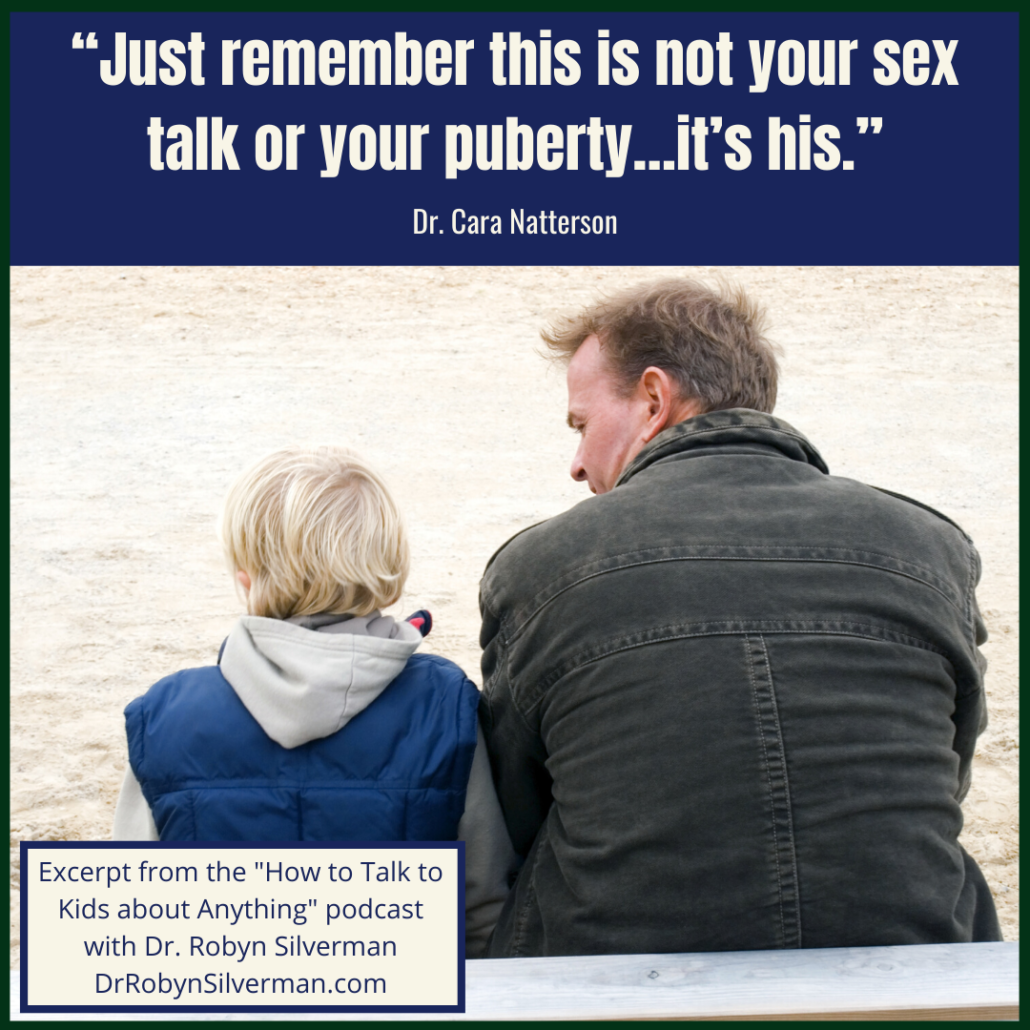 process of transformation is very universal.”
process of transformation is very universal.” - “Eye contact can further magnify an already tricky moment.”
- “Learn to be comfortable with the silence.”
- “No matter how close you are with your child, there are going to be things that they’re not going to be able to talk to you about. Pick the person ahead of time with your child. Then you can forewarn the person who is the surrogate!”
- “Just remember this is not your sex talk or your puberty…it’s his.”
- “The average first viewing of pornography for boys in this country is somewhere between age 11 and 13. These boys are not going out looking for porn. Porn is finding them. Porn is the sex education that we don’t want for our boys. We want our boys to have positive and healthy relationships—and certainly positive and healthy sexual relationships when they are older. This statistic has meant that, whether you like it or not, you have to begin the conversations around sex and healthy positive relationships- both boys and girls- at home. It cannot be entirely outsourced to others like schools.
- “It’s very important to separate out being sex positive and sending nudes. Sending nudes is about making decisions with your body that have consequences that you aren’t considering in the long run- and that is how the tween and teen brain is wired.”
- “The data show that when boys are in puberty, they get an average of 11-12 erections per day…that’s pretty inconvenient.”
- “Parents need to educate themselves about the body pressures for boys and then the best conversation to have with your kids over the years is; ‘how do you feel in your body and do you feel pressures?’ Keep the same language we have for our girls and not to just blow it off. We have been blowing it off for our boys.”
- Parents; let’s start conversations with sons about any or all of this. They do go quiet when they go into puberty. Some do close their doors. And we should, as parents, be opening the doors- knock first- but open the door and engage them. If we don’t, we don’t give them language and we don’t give them the opportunity to think through all of these things that are facing them. And that’s not fair. It’s our job to keep them safe and healthy. And this is keeping them safe and healthy.”

